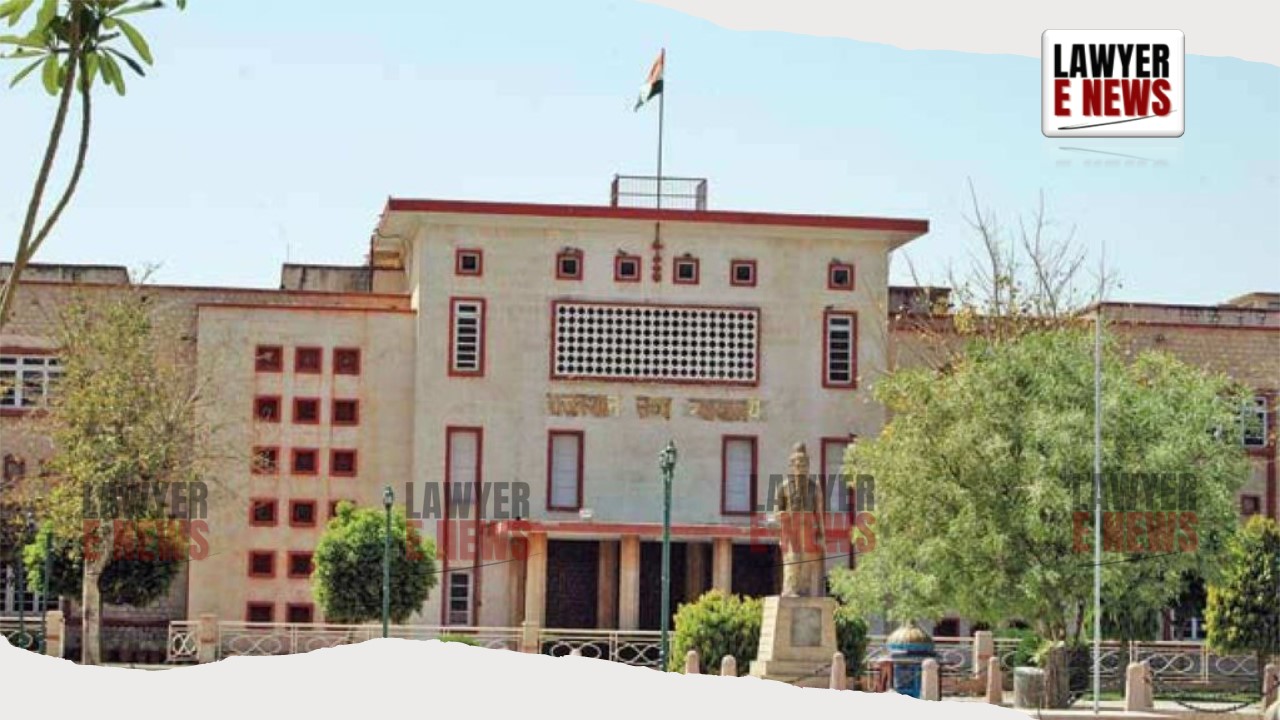-
by Admin
15 February 2026 5:35 AM



Rajasthan High Court, in United India Insurance Co. Ltd. vs. Jayantilal & Others, dismissed multiple appeals filed by the insurance company challenging the compensation awarded by the Motor Accident Claims Tribunal (MACT) to claimants injured or killed in a motorcycle-tractor collision. The court held that mere detection of alcohol in the stomach during a post-mortem is insufficient to establish intoxication or negligence on the part of the deceased motorcycle driver. The insurance company's liability was upheld in most cases, except for a case where an occupant of the tractor was not covered under the insurance policy.
The appeals arose from a motor accident that occurred on April 12, 2009, involving a motorcycle and a tractor-trolley in Dungarpur, Rajasthan. The motorcycle, carrying four persons, collided with a tractor insured by United India Insurance under a “Farmer’s Package Policy.” Two motorcyclists died, and two others were injured in the accident. The victims' families and injured parties filed claims for compensation, which were awarded by the MACT. The insurance company appealed, contesting liability on grounds of policy violations and contributory negligence, citing that the motorcycle driver had consumed alcohol before the accident.
The insurance company presented two main arguments: (1) the deceased motorcycle driver had consumed alcohol, and (2) the tractor-trolley was not being used for agricultural purposes at the time of the accident, violating the insurance policy conditions.
The court scrutinized the post-mortem report, which indicated a "poor smell of alcohol" in the deceased driver's stomach. However, the court noted that this alone could not prove the driver was intoxicated or negligent. Citing Jiju Kuruvila & Ors. v. Kunjujamma Mohan & Ors. (AIR 2013 SC 2293), the court reiterated that merely detecting alcohol in the stomach, without additional evidence of intoxication impairing the driver’s control, is insufficient to establish negligence.
“Merely a poor smell of alcohol as determined by the doctor cannot lead to the conclusion that the deceased was negligent while driving the motorcycle.” [Para 23]
In a separate appeal concerning an occupant injured while riding the tractor, the court found that the insurance policy did not cover occupants of the tractor, as the policy was a “Farmer’s Package Policy” meant solely for agricultural purposes. The insurance company was exonerated from liability for claims concerning the tractor occupant, as no premium had been paid for such coverage.
“The risk of an occupant sitting on the tractor is not covered within the ambit of the insurance policy, and therefore, the insurance company’s liability is exonerated in this case.” [Para 31]
The insurance company argued that the deceased motorcycle driver, Sanjay Kumar, was negligent due to alcohol consumption, relying on the post-mortem report. However, the court emphasized that Section 185 of the Motor Vehicles Act requires proof of alcohol levels exceeding 30 mg per 100 ml of blood to establish intoxication. Since no such evidence was provided, the court dismissed the insurance company’s claims of contributory negligence due to alcohol consumption.
The insurance company also contended that the tractor was being used for non-agricultural purposes (transporting bricks) at the time of the accident, violating the insurance policy. The court, however, ruled that the transportation of bricks to build a farm wall constituted agricultural use, thereby holding the insurance company liable for claims related to the tractor’s use.
“The use of the tractor for transporting bricks for a farm-wall falls under agricultural purposes, and thus, the insurance company remains liable under the policy.” [Para 26]
The court exonerated the insurance company from paying compensation for injuries to a passenger who was riding on the tractor at the time of the accident. The tractor was insured only for agricultural use, and no premium had been paid for passenger coverage.
“The occupant of the tractor was not insured under the policy, and the insurance company is absolved of liability in this case.” [Para 31]
The court adjusted the interest rate on the awarded compensation from a higher penalty rate imposed by the Tribunal to the standard rate of 6% per annum, aligning with the legal principles established by the Supreme Court in National Insurance Co. Ltd. v. Keshav Bahadur (AIR 2004 SC 1581).
The Rajasthan High Court upheld the MACT’s compensation awards to the claimants, dismissing most of the insurance company’s appeals. It ruled that alcohol consumption alone does not prove negligence and that the insurance policy covered the tractor's agricultural use. However, the court exonerated the insurance company from liability for an occupant of the tractor, as the policy did not extend coverage to passengers.
Date of Decision: September 12, 2024
United India Insurance Co. Ltd. vs. Jayantilal & Others
